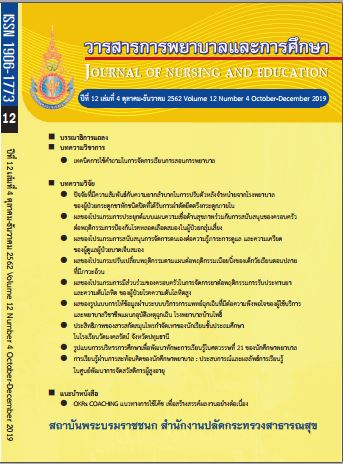The Effects of A Self-Management Support Program on The Knowledge, Burden of Care, and Stress of the Caregivers of Patients with Traumatic Brain Injury
ผลของโปรแกรมการสนับสนุนการจัดการตนเองต่อความรู้ ภาระการดูแล และความเครียดของผู้ดูแลผู้ป่วยบาดเจ็บสมอง
Keywords:
Self-management support program, Caregiver knowledge, Caregiver burden, Caregiver stress, Traumatic brain injury, CaregiverAbstract
ABSTRACT
This purpose of quasi-experimental research was to examine effect of self-management support program on knowledge, burden of care, and stress of traumatic brain injury patient’s caregivers. The sample was caregivers of the moderate or severe traumatic brain injury (TBI) patients. Purposive sampling was used to select 66 caregivers of TBI patients, and then these caregivers were divided to two groups as 33 of experimental and 33 of control groups by using matching sampling. The intervention was self-management support program. The instruments for collecting data consisted of 1) demographic data questionnaire for TBI patient and caregiver, 2) caregiver knowledge of care for TBI patient questionnaire (CGK), 3) caregiver burden scale (CGB), and 4) caregiver stress questionnaire (CGS). The reliability was tested. Cronbach’s alpha coefficient of CGK, CGB, and CGS were 0.84, 0.80, and 0.80 respectively. Data analysis was performed by using Chi-Square test, Fisher’s exact test, Independent t-test, and Paired t-test
The results revealed that 1) A comparison of mean score of CGK CGB CGS in experimental group before and after intervention showed that the CGK mean score different with a statistical significance of .05 (p≤.001) while the CGB mean score and the CGS mean score different with a statistical significance (p <.001). 2) Regarding the comparison of the mean score between the experimental group and the control group, the results showed that after receiving the program, the CGK mean score in the experimental group was statistically significantly difference of the control group at .05 (p<.001). Furthermore, the CGB and CGS mean score were statistically significantly difference of the control group at .05 (p<.001). As a results, the self –management support program that included providing knowledge and management skills in caregiver’s of traumatic brain injury patients for increasing knowledge and also reduced burden of care and caregiver’s stress for caregivers of brain injury patients.
References
1. World Health Organization. Global Status Report on Road Safety [online]. 2018 [cited 2019/6/30]. Available from: http://www.who.int/violence_injury_prevention/road_satatus/2018/en/
2. Thailand Road Safety Current Situation of Road Safety in Thailand [Cited 2013/6/30] Available from http://trso.thairoads.org/statistic/national/N-SPI-A/N-SPI-A12N-SPI-A1-01 (in Thai)
3. Centers for Disease Control and Prevention (CDC). Report to Congress Traumatic Brain Injury in the United States: Epidemiology and Rehabilitation. 2015; Atlanta: Centers for Disease Control and Prevention.
4. Hickey, J. V. The Clinical Practice of Neurological and Neurosurgical Nursing. (6th ed.). 2009; Philadelphia: J.B. Lippicott.
5. Li, M., Zhao, Z., Yu, G., & Zhang J. Epidemiology of Traumatic Brain Injury over the World: a Systematic Review. Austin Neurol & Neurosci, 2016; 1(2), 1-14
6. Bayen, E., Jourdan, C., Ghout, I., Darnoux, E., Azerad, S., Claire, V. A.,…Azouvi, P.
Objective and Subjective Burden of Imformal Caregivers 4 Year after a
Severe Traumatic Brain Injury: Results from the Paris-TBI Study. Journal of Head
Trauma Rehabilitation, 2014; 1, 1-9.
7. Jung-Won, L. & Zebrack, B. Caring for Family Members with Chronic Physical Illness: A Critical Rreview of Caregiver Literature. Health Qual Life Outcome, 2012; 34, 147-56.
8. Kaweepatranon, A. The Effects of a Self-Efficacy Promoting Program for Care of Stroke Patients on Caregivers During the Transition Phase from Hospital to Home. Dessertation of Master Degree of Science (Adult nursing) thammasat univercity, 2013. (in Thai)
9. Blake, H. Caergiver Stress in Traumatic Brain Injury. International Journal of
Therapy and Rehabilitation, 2013; 15(6), 263-271.
10. Harnirattisai, T., & Raethong, Parinya R. Perceived Preparedness in Caregiving among Stroke’s Caregivers. Thai Science and Technology Journal, 2013; 21(7), 634-639. (in Thai)
11. McGowan, P. Self‐Management Support. University of Victoria, 2006.
12. Bandura, A. Self-Efficacy: The Exercise of Control. New York: W.H. Freeman, 1997.
13. Jaywan, PJ. Effects of Empowerment on Caring Capabilities Among Caregivers of Patients with Traumatic Brain Injury. Dessertation of Master Degree of Science (Adult nursing) Changmai Univercity, 2014. (in Thai)
14. Toonsiri, C., Sunsern, R., & Lawang, w. Development of the Burden Interview for Caregiversof Patients with Chronic Illness. Journal of Nursing and Education, 2011; 4(1), 62-75. (in Thai)
15. Montgomery, R. & Borgatta, E. The Effects of Alternative Support Strategies.
Gerontologist, PubMed, 1989; 29: 457–464.
16. Rimnin, K., Wongvatunyu, w., & Monkong, S. Gerontological Nursing Effects of the Communication Support Program on the Caregiver’s Knowledge and Self-Efficacy to Care for Stroke Patients with Communication Impairment, 2016; 22 (3), 293-309. (in Thai)
17. Junthontima, N. Effects of Coaching Program on Preparedness and Burden Among Caregivers of Older Persons with Stroke. Dessertation of master degree of science (Adult nursing) Changmai univercity, 2014. (in Thai)
18. Sawatdinaruenart, S., Sae-Sia, W., & Songwattana, P. Effects of Coaching Program on Preparedness and Burden Among Caregivers of Older Persons with Stroke, Princess of Naradhiwas University Journal, 2013; 5(2), 1-12. (in Thai)






